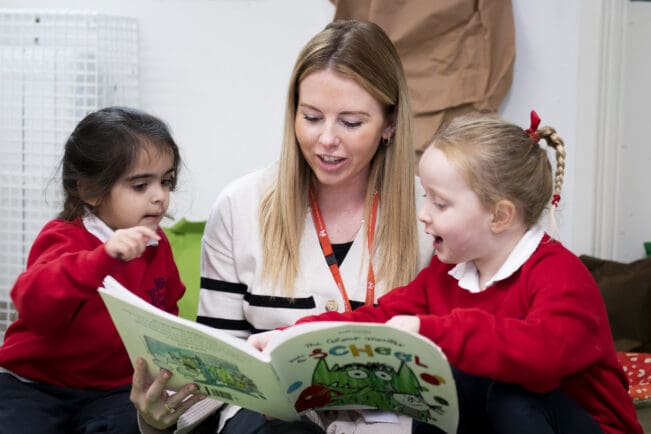
Developing Speaking and Listening Skills in the Early Years
A child’s experiences in their first five years of life are of huge importance as they lay the foundations for effective future learning and positive social development. During this time a child’s brain develops faster than at any other point. Children are like sponges, absorbing information at an astonishing rate.
From the beginning, effective communication skills are the cornerstone of phonics development (which underpins reading and writing) and the key to healthy social and emotional development. As children learn to express their needs and feelings through speech, they also develop empathy, active listening, and the ability to build relationships. They are also closely tied to future academic success. Children who have a rich vocabulary and strong listening skills are better equipped to grasp complex instructions, understand concepts, and communicate effectively.
Furthermore, they go hand in hand with critical thinking. When children talk, ask questions, and respond to others, they learn to think critically and form logical arguments, skills crucial for problem-solving, decision-making, and successful lifelong learning.
So why are the Early Years key?
Between the ages of 2 and 3 years, children’s language becomes more sophisticated with their vocabulary increasing rapidly; when talking, they begin to form longer sentences, hold conversations, and ask simple questions.
Next, between 3 and 5 years, a young child’s language skills become increasingly refined, and vocabulary expands further, with them mastering more complex sentence structures. They develop the ability to recount past events, use a range of tenses and use talk to explain what is happening. They also begin to develop a growing awareness of letter sounds, basic reading comprehension. Listening skills also develop hand in hand with speaking abilities.
How can we help both at home and school?
- Create a Language Rich Environment:
The key is to surround children with words and language from an early age. We should talk to them about everyday activities, point things out, and describe what we are doing, whilst fostering their curiosity by encouraging them to ask questions and supporting them to share their thoughts, feelings, and experiences.
- Read Lots of Stories:
Not only do children love having stories read to them but reading aloud to children captivates their imagination. Their listening comprehension increases if you can ask them questions, or to make predictions, and by getting them to retell the stories in their own words. Incorporating small world characters and puppets adds additional excitement.
- Introduce Audiobooks:
Introducing children to age-appropriate audiobooks helps their listening skills which are the foundation of reading comprehension. When children actively listen to stories or conversations, it helps them to understand the meaning behind words, and it nurtures a love of books.
- Play Rhyming Games:
Playing rhyming games, singing nursery rhymes and simple songs with young children helps them recognise and consolidate sounds through the rhythm and repetition in these activities.
- Play Other Games:
Make good use of a car journey by playing games that involve listening and speaking such as I Spy and Simon Says. Board games further develop these skills and a child’s ability to hear individual sounds in words.
- Visit Lots of Different Places:
Take advantage of outdoor environments to engage children in sensory-rich experiences and have spontaneous conversations with them about what they can see and feel as this will expand their vocabulary. Take trips to the woods, parks and the beach. Museums and art galleries provide excellent indoor adventures.
- Facilitate Role-Play:
Children love role-play and all we need to do is provide them with the opportunities and resources. Whether pretending to be a shopkeeper, firefighter or astronaut, children engage in conversations, negotiate roles, and problem-solve whilst using descriptive language and often expressing emotions.
- Provide opportunities for Show-and-Tell:
Children love talking about their interests, experiences, and achievements. Show and tell opportunities foster confidence and public speaking skills (an important life skill for the future). Encourage children to be active listeners by asking questions, offering feedback, and valuing each other’s contributions.
- Be a Role Model:
Children often imitate our behaviour, so it is important to model effective communication by speaking clearly and listening actively when a child talks.
- Limit Screen Time:
Excessive screen time can hinder the development of speaking and listening skills. Setting reasonable limits on television and device usage whilst balancing this with real-life interactions and activities will benefit the children enormously.
As parents and teachers, we play a key role in nurturing speaking and listening skills. Time spent on activities such as those above, will establish a lifelong love of learning and literacy. By prioritising the development of speaking and listening skills in the Early Years and providing ample opportunities for practice and growth, we can empower children to become confident communicators, critical thinkers, and lifelong learners, setting them on a path to effective learning and a happy and successful future life well beyond their school days.
